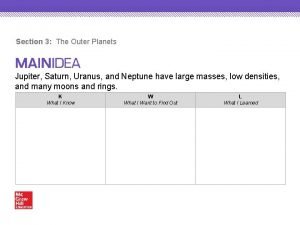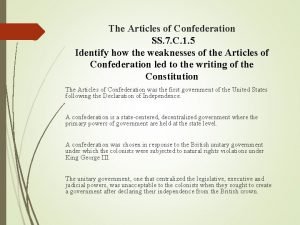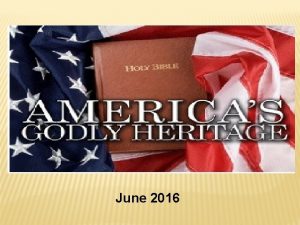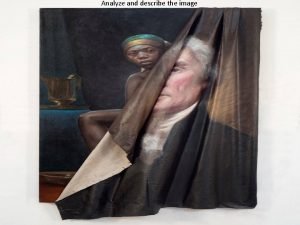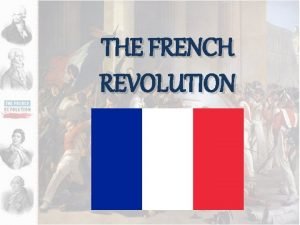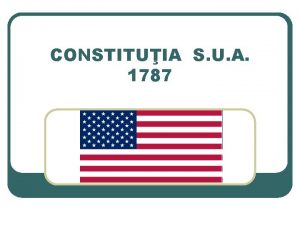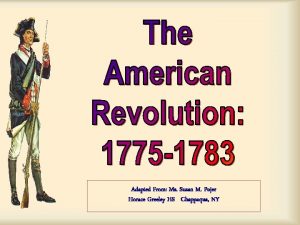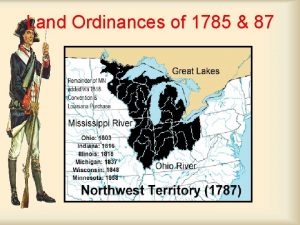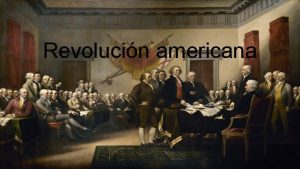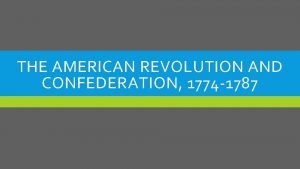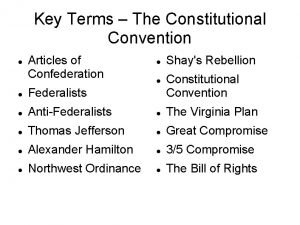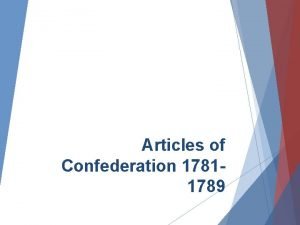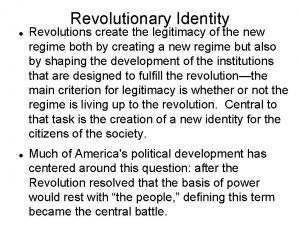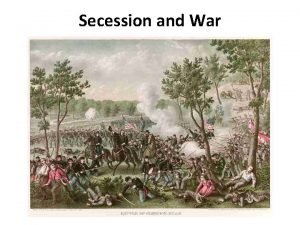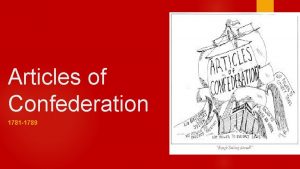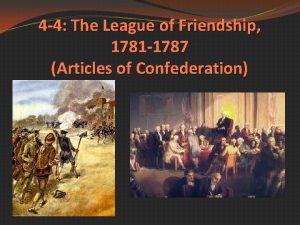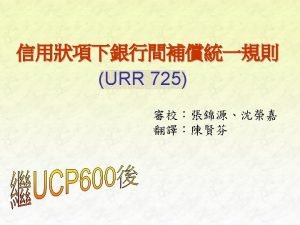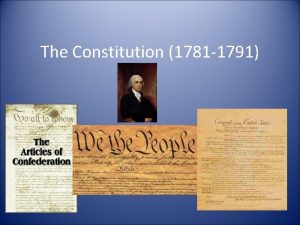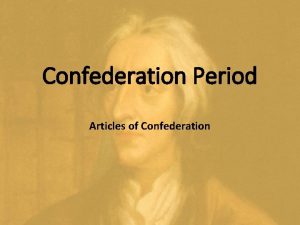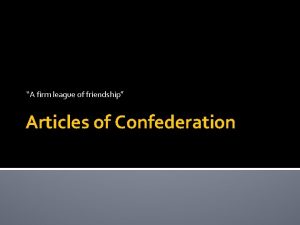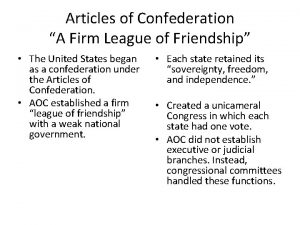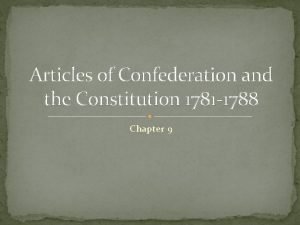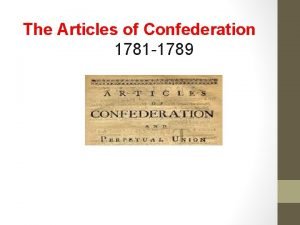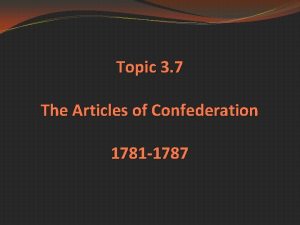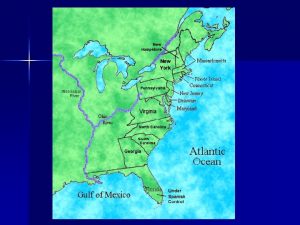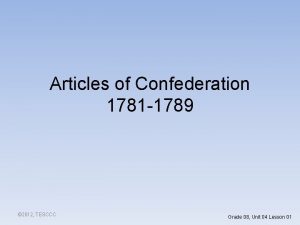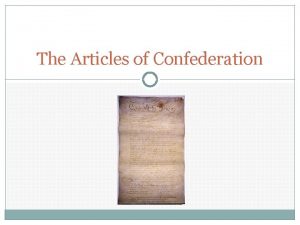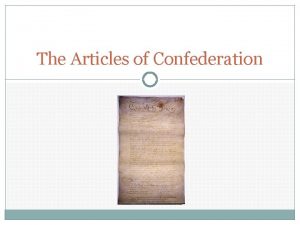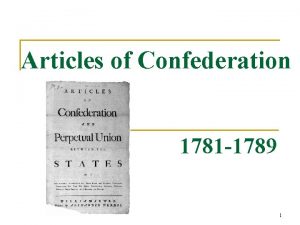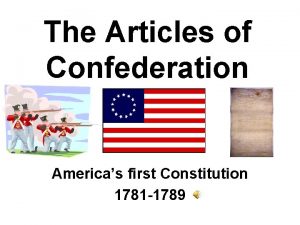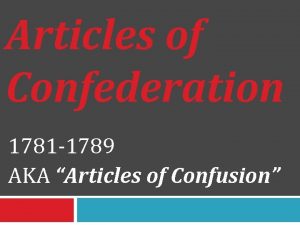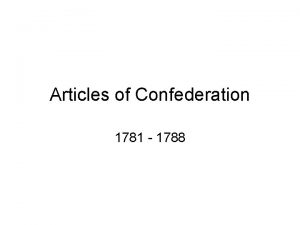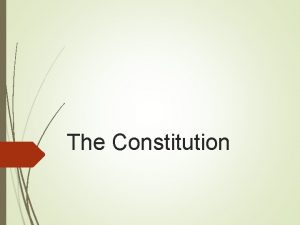Article of Confederation 1781 1787 the firm league































- Slides: 31

Article of Confederation 1781 -1787 (the firm league of friendship) • 1 national legislature • 1 state=1 vote • No courts or president • Authority rests with the states

Powers of the Art of Confed War and Peace Send/receive ambassadors Make treaties Borrow money Set up monetary system Build navy Raise army by asking states Standards of weights/measures Settle disputes among states (if asked) • Sell western lands • • •

Weaknesses of Art of Confed • • One vote per state (not on pop. ) No taxes Can’t regulate commerce No executive No national courts Need all states for amendment 9/13 to pass a law Land disputes (NY v. PA, Vermont>Canada)

Annapolis Meeting 1786 • Organized to fix the commercial problems of the Articles of confederation • 5 states with 12 delegates show up. • Try again next year.

Shay’s Rebellion 1786 -87 • Revolutionary war soldiers/farmers upset with foreclosure of farms, so shut down the courts. • State militia won’t stop • Federal army can’t stop • Private army raised to stop them. • Shows need for strong federal gov.

1787 Philadelphia convention (Constitutional Convention) • 12 states show up (no Rhode Island, it likes its own paper money) • 55 delegates (8 signed the Dec of Ind, 7 had been governors, 34 lawyers, 39 had served in Congress of the Confederation)

Constitutional Convention • 55 delegates. 8 signed Dec. of Ind. 7 had been governors. 34 lawyers. 39 served in Congress of Confederation.

But, Who is There? • • • NO Jefferson abroad John Adams abroad Sam Adams ill Patrick Henry refused • Yes • Washington (whew, that was close) • Madison (you can’t tell since he is a short guy) • Franklin (getting pretty old) • Hamilton (he is an elitist)

Philosophy in action • Human Nature-Thomas Hobbs Leviathan 1651. • Man needs strong government to overcome his natural state of war. Men love power and money. • Political Conflict comes from faction (Madison), particularly over property.

More Philosophy • Object of Government-Protect private property • Nature of Government-(Montesquieu) Limited gov. by checks and balances. This help gov protect people’s property, rather than take it.

Constitution= ? ? ? ? ?

Constitution=Compromise • 9 of 13 needed to ratify • 5 states can block the Constitution, so must have agreement on most things. • There are strong differences between the 13 states that will make this difficult

Representation • Virginia plan=representation based on population • New Jersey Plan=states get equal votes (like Articles of Confed). • Connecticut Compromise (the GREAT Compromise)= 2 house (bicameral) legislature. House of Reps for Virginia and the Senate for New Jersey

Slavery • Can slaves vote? Slavery legal in all states but Massachusetts. • Slaves make up large portions of southern states and would impact House of Reps. • 3/5 th compromise.

Voting Rights • Who gets to vote? • Left to states to decide. If you can vote in a state election, you can vote in a federal election.

Economic issues • Problems were states using tariffs, states had own paper money, Congress had trouble raising money. • Taxes=Congress could tax, but no DIRECT taxes. • Congress could regulate the value of money, and has to pay the debts left over from the war.

Continued • Congress allowed to regulate Commerce, but: • No export taxes • Could not regulate the slave trade for 20 years.

Picking the President? • Can’t trust the people to vote (look at Shay’s Rebellion) • Can’t trust the Congress to choose, it would encourage corruption • Electoral College created where people choose the people who will choose the President. (thinkchoose the smartest person in town to make the choice for you) • Also look at if Pres should be a committee? How many terms? But no worries, George Washington is the MAN!!!!!!!

Constitution and the People (People may not be trusted) • People only vote for House of Reps • Democracy not mentioned • Difficult to amend the Constitution • Checks and balances makes it difficult for things to be done

Madisonian Model for Constitution • Worry about faction (usually from wealth) • Place gov. (as much as possible) beyond direct control of majority (only House of Rep elected by the people) • Separation of powers (to limit self-interest of men) • Checks and balances is key to stopping factions from gaining too much power.

Ratification of Constitution • Constitution Day-Sept 17, 1787. Then sent to states. • Delaware first to ratify on Dec 7, 1787. • States/people debate whether to pass the Constitution

Federalists (Nationalists) • Alexander Hamilton • James Madison • John Jay • Write the federalist papers (84 of them) to encourage passage of the Constitution.

Antifederalists (States rights) • Many varied arguments against passage of Constitution. Robert Yates George Mason Patrick Henry

• In Groups of 4 or less EXPLAIN the arguments of the anti-federalists. 8 points.

Arguments Against Constitution • Gives elites all the power • Misses many individual liberties/NO BILL OF RIGHTS!!!!!! (states all have them) • Weakens power of the states • Some oppose the solid economy and single currency (creditors/debtors)

More Arguments • Rhode Island likes its paper money • More powerful federal gov. can more easily limit the people • Federal courts can overturn state courts • Congress may tax heavily • President can lead a large army • No mention of God in Constitution • Some view the whole process as illegal. Not sent to establish Constitution, just fix the articles.

The Formal Amendment Process

A different Visual for Amending (formal)

Informal Process • Judicial Interpretation-1803 Marbury v. Madison allows for Judicial review. Ex. Plessy v. Ferguson changes with Brown v. Board of Ed • Changing Political Practice- Political parties, electoral college, military strength changes the Presidency

Informal Continued • Technology- media, bureaucracy, social security • Increasing Demands on Policy Makers- US role as a superpower changes President’s responsibilities • Elastic Clause (Necessary and Proper Clause)allows for expansion of Congressional Power

Informal (last bit) • More common than formal. Easier to do than formal. • Can target institutions that may be more receptive. Ex. Civil Rights or environmentalists may target the courts. This is 9 justices rather than the whole formal process.
 Jupiter spins once on its axis in a little less than
Jupiter spins once on its axis in a little less than Bolzano (1781 – 1848)
Bolzano (1781 – 1848) Weaknesses of the articles of confederation
Weaknesses of the articles of confederation Constitutional convention 1787
Constitutional convention 1787 Northwest ordinance of 1787
Northwest ordinance of 1787 Northwest ordinance of 1787
Northwest ordinance of 1787 Sophie of france (1786-1787)
Sophie of france (1786-1787) Censitar
Censitar Northwest ordinance of 1787
Northwest ordinance of 1787 Why was the french government bankrupt in 1787
Why was the french government bankrupt in 1787 Northwest ordinance of 1787
Northwest ordinance of 1787 Independencia eeuu
Independencia eeuu Electoral college compromise 1787
Electoral college compromise 1787 Northwest ordinance of 1787
Northwest ordinance of 1787 Northwest ordinance of 1787
Northwest ordinance of 1787 Usa 1787
Usa 1787 1787-1776
1787-1776 Northwest ordinance of 1787
Northwest ordinance of 1787 Vẽ hình chiếu đứng bằng cạnh của vật thể
Vẽ hình chiếu đứng bằng cạnh của vật thể Sự nuôi và dạy con của hươu
Sự nuôi và dạy con của hươu Quá trình desamine hóa có thể tạo ra
Quá trình desamine hóa có thể tạo ra Dot
Dot Môn thể thao bắt đầu bằng chữ f
Môn thể thao bắt đầu bằng chữ f Hát kết hợp bộ gõ cơ thể
Hát kết hợp bộ gõ cơ thể Biện pháp chống mỏi cơ
Biện pháp chống mỏi cơ Phản ứng thế ankan
Phản ứng thế ankan Thiếu nhi thế giới liên hoan
Thiếu nhi thế giới liên hoan Trời xanh đây là của chúng ta thể thơ
Trời xanh đây là của chúng ta thể thơ điện thế nghỉ
điện thế nghỉ Chó sói
Chó sói Fecboak
Fecboak Sơ đồ cơ thể người
Sơ đồ cơ thể người
